Classroom Resource Library
Celebrate Dr. Martin Luther King, Jr.'s historic "I Have a Dream" speech with a mobile that inspires you to think about your own dreams.
Constitution 101 Resources
1.1- Activity- What is Civil Dialogue?
Constitution 101 Resources
1.2 Introduction Activity- Why Have a Civil Dialogue?
Constitution 101 Resources
1.3 Activity Guide: Structural Constitution Walkthrough
Constitution 101 Resources
1.4 Activity Guide: Introduction to the Methods of Constitutional Interpretation
Constitution 101 Resources
1.5 Activity Guide: Constitutional Interpretation Method Identification
Constitution 101 Resources
1.5 Info Brief: Possible Quote for Worksheet
Constitution 101 Resources
Constitution 101 Resources
1.7 Printable Knowledge Check: Constitutional Conversations and Civil Dialogue
Constitution 101 Resources
1.8 Info Brief: Constitutional Conversation Roles and Norms
Constitution 101 Resources
10.1 Primary Source: First Amendment
This activity is part of Module 10: The First Amendment from the Constitution 101 Curriculum
Constitution 101 Resources
10.2 Video Reflection: The First Amendment
Constitution 101 Resources
10.3 Activity Guide: Religion Clauses
Constitution 101 Resources
10.3 Info Brief: Kennedy v. Bremerton School District Case
Constitution 101 Resources
10.4 Activity Guide: Speech Quotation Analysis
Constitution 101 Resources
10.4 First Amendment quotes
Constitution 101 Resources
10.4 Whitney v. California Case Quote
Constitution 101 Resources
10.5 Activity Guide: Assembly and Petition
Constitution 101 Resources
10.5 Primary Source
Constitution 101 Resources
10.5 Primary Source: Frederick Douglass, Plea for Freedom of Speech in Boston (1860)
Constitution 101 Resources
10.5 Primary Source: Petition from the Pennsylvania Society for the Abolition of Slavery to the First Congress (1790)
Constitution 101 Resources
10.5 Primary Source: Proceedings of the State Convention of Colored People, Held at Albany, New York (1851)
Constitution 101 Resources
10.5 Primary Source: Seneca Falls Declaration (1848)
Constitution 101 Resources
10.5 Primary Source: The Gag Rules Debate (1835-1840)
Constitution 101 Resources
10.7 Printable Knowledge Check: First Amendment: Speech, Press, Religion, Assembly, and Petition
Constitution 101 Resources
11.2 Video Reflection: The Fourth Amendment
Constitution 101 Resources
11.3 Activity Guide: A Reasonable Expectation of Privacy
Constitution 101 Resources
11.4 Activity Guide: Key Terms - Fourth Amendment
Constitution 101 Resources
11.5 Case Brief: Fourth Amendment Supreme Court Cases
Constitution 101 Resources
11.5 Primary Source: Carpenter v. United States (2008)
Constitution 101 Resources
11.5 Primary Source: Katz v. United States (1967)
Constitution 101 Resources
11.5 Primary Source: Mapp v. Ohio (1961)
Constitution 101 Resources
11.5 Primary Source: Olmstead v. United States (1928)
Constitution 101 Resources
11.5 Primary Source: Terry v. Ohio (1968)
Constitution 101 Resources
11.6 Printable Knowledge Check: The Fourth Amendment
Constitution 101 Resources
11.7 Activity Guide: Speech on the Writs of Assistance
Constitution 101 Resources
11.7 Primary Source: James Otis
Constitution 101 Resources
12.1 Visual Info Brief: Patrick Henry and Slavery
Constitution 101 Resources
12.2 Video Reflection: Slavery in America
Constitution 101 Resources
12.3 Info Brief: Anti-Slavery Movements Throughout American History
Constitution 101 Resources
12.3 Primary Source: Abraham Lincoln, Cooper Union Address (1860)
Constitution 101 Resources
12.3 Primary Source: American Anti-Slavery Society, Declaration of Sentiments (1833)
Constitution 101 Resources
12.3 Primary Source: David Walker, Appeal to the Colored Citizens of the World (1829)
Constitution 101 Resources
12.3 Primary Source: Frederick Douglass, What to the Slave is the Fourth of July (1852)
Constitution 101 Resources
12.3 Primary Source: Phillis Wheatley, Letter to Reverend Samuel Occum (1774)
Constitution 101 Resources
12.3 Primary Source: Prince Hall, Petition to the Massachusetts Legislature (1777)
Constitution 101 Resources
12.3 Primary Source: William Yates, The Rights of Colored Men (1838)
Constitution 101 Resources
12.4 Activity Guide: Lincoln and Preserving the Union Note Catcher Tool
Constitution 101 Resources
12.4 Activity Guide: Reasons for Secession and Lincoln’s Initial Response Note Catcher Tool
Constitution 101 Resources
12.4 Info Brief: Slavery in America
Constitution 101 Resources
12.4 Primary Source: A Declaration of the Immediate Causes which Induce and Justify the Secession of the State of Mississippi from the Federal Union (1861)
Constitution 101 Resources
12.4 Primary Source: Abraham Lincoln, Emancipation Proclamation (1863)
Constitution 101 Resources
12.4 Primary Source: Abraham Lincoln, First Inaugural Address and Message to the Special Session of the 37th Congress (1861)
Constitution 101 Resources
12.4 Primary Source: Abraham Lincoln, Second Inaugural Address (1865)
Constitution 101 Resources
12.4 Primary Source: Abraham Lincoln, The Gettysburg Address (1863)
Constitution 101 Resources
12.4 Primary Source: South Carolina Declaration of Secession (1860)
Constitution 101 Resources
12.4 Primary Source: The 13th Amendment (1865)
Constitution 101 Resources
12.5 Primary Source: Carl Schurz’s Report on the Condition of the South (1865)
Constitution 101 Resources
12.5 Primary Source: Charles Sumner, One Man Power vs. Congress (1866)
Constitution 101 Resources
12.5 Primary Source: Equal Suffrage Address from the Colored Convention in Norfolk, VA
Constitution 101 Resources
12.5 Primary Source: Jacob Howard, Speech Introducing the Fourteenth Amendment to the Senate (1866)
Constitution 101 Resources
12.5 Primary Source: John Bingham, One Country, One Constitution, One People (1866)
Constitution 101 Resources
12.5 Primary Source: Thaddeus Stevens, Speech Introducing the Fourteenth Amendment (1866)
Constitution 101 Resources
12.6 Primary Source: Declaration of Independence
Constitution 101 Resources
12.7 Printable Knowledge Check: Slavery in America
Constitution 101 Resources
13.1 Info Brief: Frances Ellen Watkins Harper
Constitution 101 Resources
13.1 Visual Info Brief: Frances Harper Quote
Constitution 101 Resources
13.2 Video Reflection: Voting Rights in America
Constitution 101 Resources
13.3 Activity Guide: Exploring Elections and Voting in the Constitution
Constitution 101 Resources
13.3 Info Brief: Elections and Voting in the Constitution
Constitution 101 Resources
13.4 Case Brief: The Supreme Court and the Vote
Constitution 101 Resources
13.4 Info Brief: The Supreme Court and the Vote
Constitution 101 Resources
13.4 Primary Source: NAACP, Platform Adopted by National Negro Committee (1909)
Constitution 101 Resources
13.4 Primary Source: Shelby County v. Holder (2013)
Constitution 101 Resources
13.4 Primary Source: South Carolina v. Katzenbach (1966)
Constitution 101 Resources
13.4 Primary Source: W.E.B. DuBois, The Souls of Black Folk (1903)
Constitution 101 Resources
13.5 Info Brief: The Women’s Suffrage Movement
Constitution 101 Resources
13.6 Activity Guide: Exploring the Vote in Your Community
Constitution 101 Resources
13.7 Printable Knowledge Check: Voting in America
Primary and Secondary Sources
13th Amendment, Congressional Copy
This handwritten congressional copy of the amendment that banned slavery is signed by President Lincoln and others.
Constitution 101 Resources
14.1 Primary Source: Black Codes from South Carolina and Mississippi
Constitution 101 Resources
14.2 Activity Guide: Introduction to the 14th Amendment
Constitution 101 Resources
14.2 Info Brief: Reconstruction and America’s “Second Founding”
Constitution 101 Resources
14.3 Video Reflection: The 14th Amendment
Constitution 101 Resources
14.4 Case Brief: Tests of the 14th Amendment
Constitution 101 Resources
14.4 Primary Source: Brown v. Board of Education of Topeka (1954)
Constitution 101 Resources
14.4 Primary Source: Dobbs v. Jackson Women’s Health Organization (2022)
Constitution 101 Resources
14.4 Primary Source: Gideon v. Wainwright (1963)
Constitution 101 Resources
14.4 Primary Source: Loving v. Virginia (1967)
Constitution 101 Resources
14.4 Primary Source: Obergefell v. Hodges (2015)
Constitution 101 Resources
14.4 Primary Source: United States v. Virginia (1996)
Constitution 101 Resources
14.4 Primary Source: United States v. Wong Kim Ark (1898)
Constitution 101 Resources
14.5 Activity Guide: Showcasing the 14th Amendment
Constitution 101 Resources
14.6 Printable Knowledge Check: The 14th Amendment: Battles for Freedom and Equality
Constitution 101 Resources
15.1 Activity Guide: The Article V Amendment Process
Constitution 101 Resources
15.2 Video Reflection: 27 Amendments Walkthrough
Constitution 101 Resources
15.3 27 Amendments Matching Game
Constitution 101 Resources
15.3 Info Brief: Periods of Constitutional Change and the 27 Amendments
Constitution 101 Resources
15.3 Visual Info Brief: 27 Amendments to the Constitution
Constitution 101 Resources
15.4 Activity Guide: Amending the Constitution
Constitution 101 Resources
15.5 Printable Knowledge Check: Article V and the 27 Constitutional Amendments
Classroom Activities
19th Amendment Class Briefing Document
Classroom Activities
19th Amendment Class Slide Deck
Classroom Activities
19th Amendment Class Worksheets
Constitution 101 Resources
2.1 Activity Guide: Quote Analysis
Constitution 101 Resources
2.2 Activity Guide: Algernon Sidney
Constitution 101 Resources
2.2 Activity Guide: Aristotle
Constitution 101 Resources
2.2 Activity Guide: Cicero
Constitution 101 Resources
2.2 Activity Guide: John Locke
Constitution 101 Resources
2.2 Primary Source: Algernon Sidney
Constitution 101 Resources
2.2 Primary Source: Aristotle
Constitution 101 Resources
2.2 Primary Source: Cicero
Constitution 101 Resources
2.2 Primary Source: John Locke
Constitution 101 Resources
2.4 Activity Guide: Key Terms - Version 2
Constitution 101 Resources
2.4 Info Brief: Declaration of Independence and the Preamble
Constitution 101 Resources
2.4 Info Sheet: Preamble Breakdown
Constitution 101 Resources
2.4 Video Reflection: Declaration of Independence
Constitution 101 Resources
2.5 Primary Source: Declaration of Independence (Short list of grievances)
Constitution 101 Resources
2.5 Primary Source: John Dickinson, Letters from a Farmer in Pennsylvania to the Inhabitants of the British Colonies (1768)
Constitution 101 Resources
2.5 Primary Source: Thomas Paine, Common Sense (1776)
Constitution 101 Resources
2.6 Printable Knowledge Check: Principles of the American Revolution
Constitution 101 Resources
2.7 Extended Activity: Social Contracts
Lesson Plans
2017 Civic Holiday Calendar: Famous Cases
The 2017 calendar explores turning points in American history with fifteen landmark Supreme Court cases.
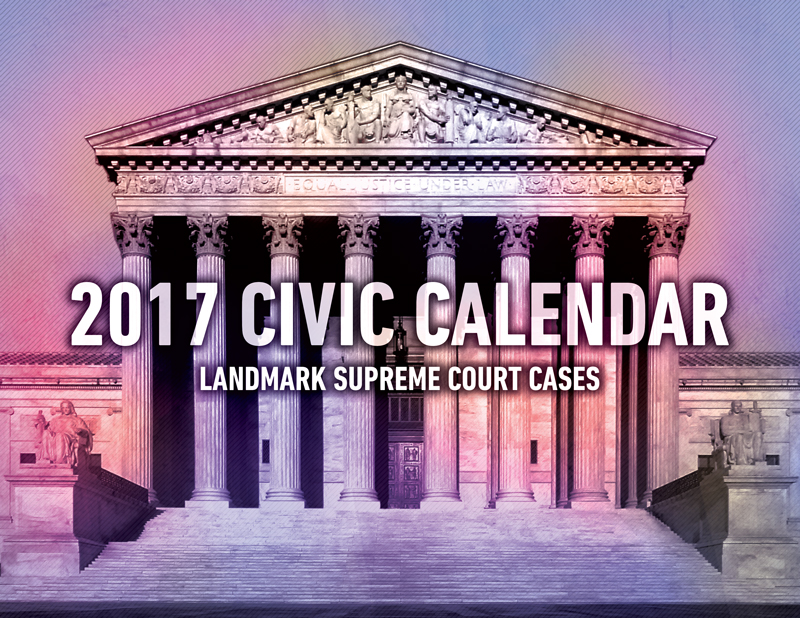
Lesson Plans
2018 Civic Holiday Calendar: 14th Amendment
To commemorate the 150th anniversary of the 14th Amendment, the Center's 2018 calendar explores its history and legacy.
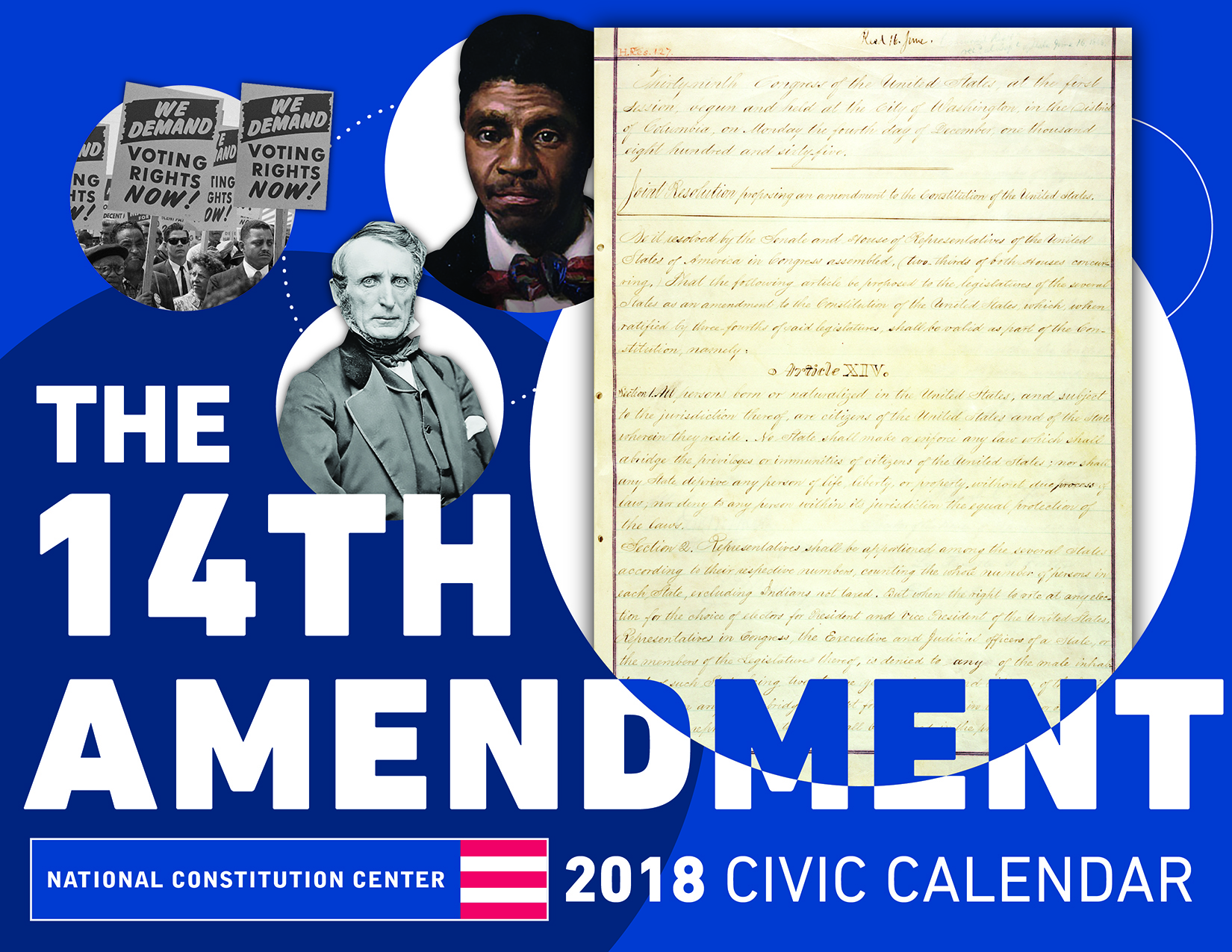
Lesson Plans
2019 Civic Holiday Calendar: The First Amendment
The 2019 Civic Calendar from the National Constitution Center not only highlights civic holidays throughout the year, but will also focus on historical events dealing with the First Amendment.
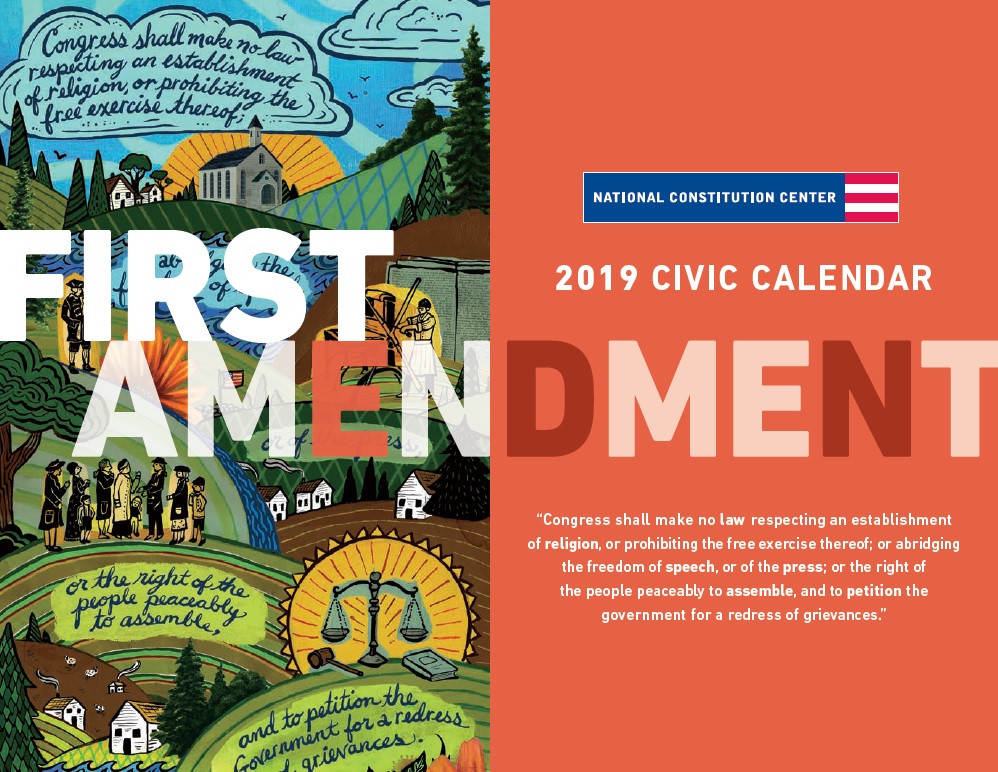
Classroom Activities
2022/2023 Civic Calendar
The National Constitution Center’s 2022-2023 Civic Calendar explores the 27 Amendments in 12 Months!
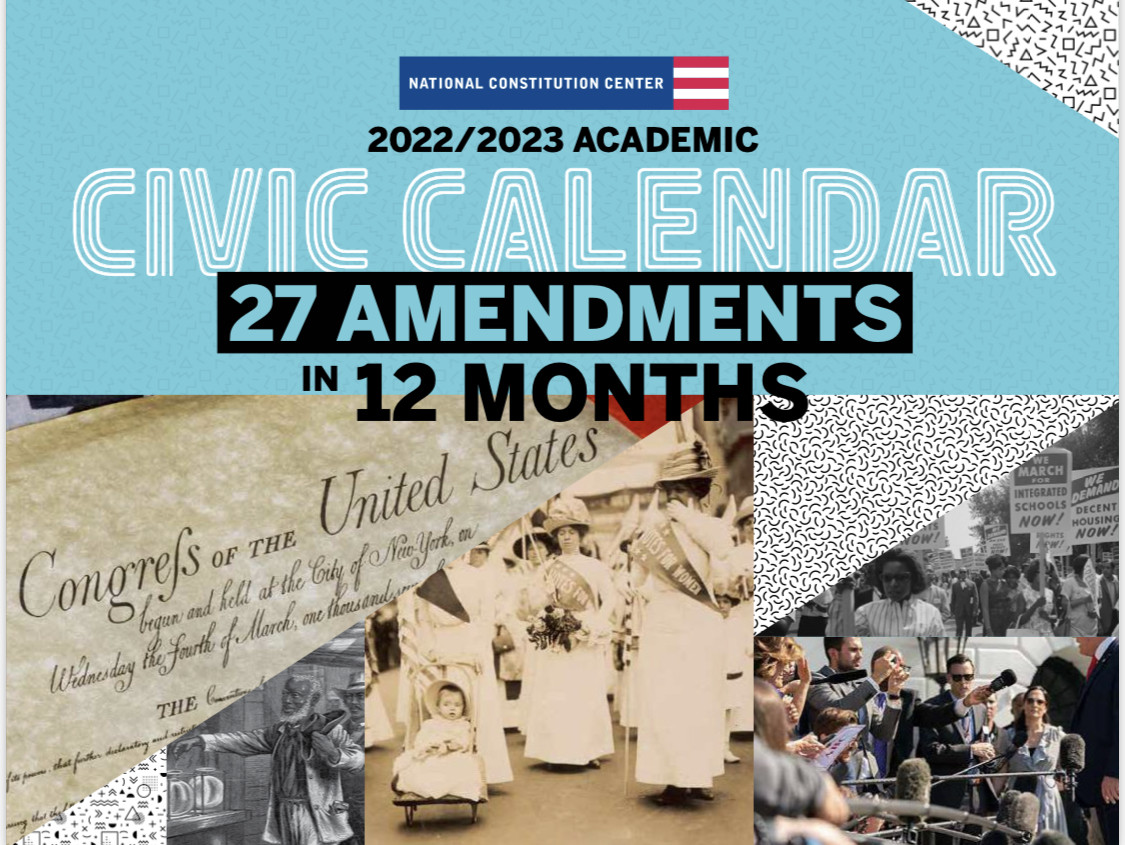
Classroom Activities
2023/2024 Civic Calendar
The National Constitution Center’s 2023-2024 Civic Calendar explores the Civil Rights Movement.
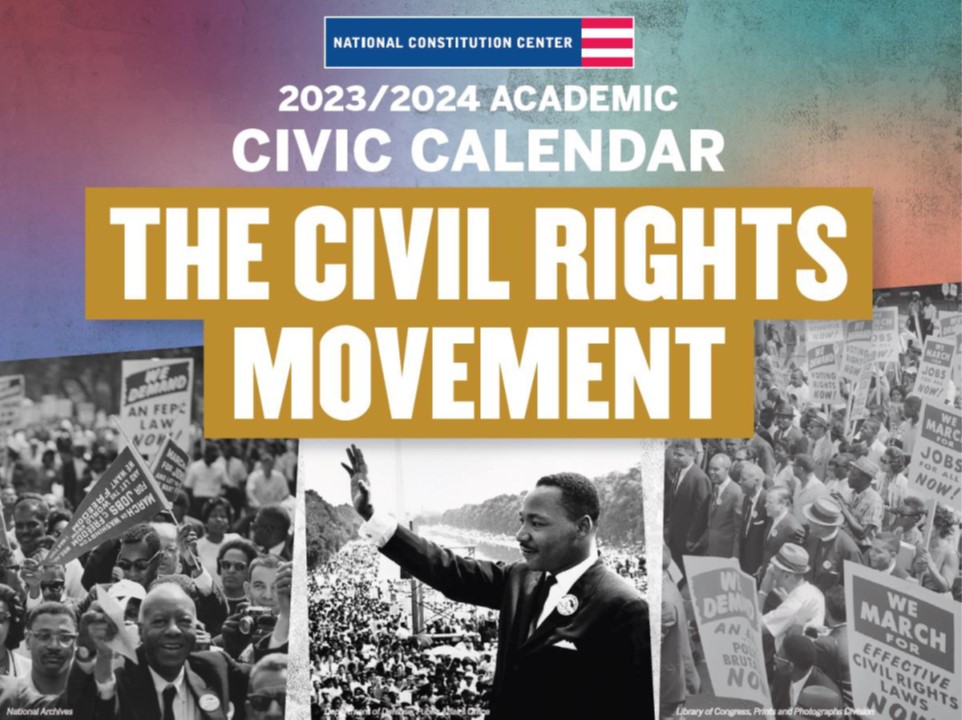
Classroom Activities
2024/2025 Civic Calendar
The National Constitution Center’s 2024-2025 Civic Calendar explores the history of elections and voting rights in the United States.
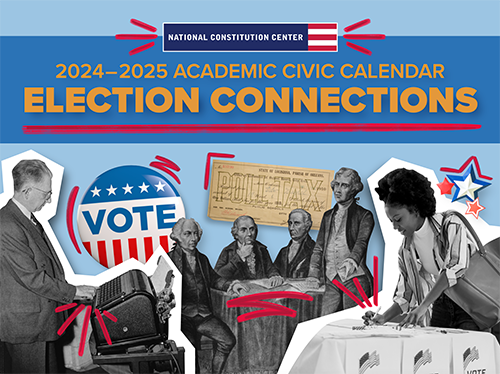
Constitution 101 Resources
3.1 Activity Guide: U.S. Constitution and Shays’ Rebellion
Constitution 101 Resources
3.1 Info Brief: Summary of Shays’ Rebellion
Constitution 101 Resources
3.1 Visual Info Brief: Image of Shays’ Rebellion
Constitution 101 Resources
3.2 Activity Guide: The Critical Period
Constitution 101 Resources
3.2 Info Brief: The Road to the Convention
Constitution 101 Resources
3.3 Activity Guide: Key Terms - Road to the Convention
Constitution 101 Resources
3.4 Video Reflection: Road to the Convention
Constitution 101 Resources
3.5 Activity Guide: Fear of Factions and Mobs
Constitution 101 Resources
3.5 Info Brief: The Federalist Papers
Constitution 101 Resources
3.5 Primary Source: Federalist No. 10 and Federalist No. 55
Constitution 101 Resources
3.7 Printable Knowledge Check: The Road to the Convention
This activity is part of Module 3: Road to the Convention from the Constitution 101 Curriculum.
Constitution 101 Resources
4.1 Activity Guide: Convention Facts
Constitution 101 Resources
4.1 Visual Info Brief: Painting of the Constitutional Convention
Constitution 101 Resources
4.2 Activity Guide: Constitutional Convention - Meet the Framers
Constitution 101 Resources
4.2 Info Brief: List of Delegates
Constitution 101 Resources
4.3 Video Reflection: Constitutional Convention
Constitution 101 Resources
4.4 Activity Guide: Compromise Analysis
Constitution 101 Resources
4.4 Info Brief: Compromises of the Convention
Constitution 101 Resources
4.5 Info Brief: Ratification Timeline
Constitution 101 Resources
4.5 Primary Source: Who were the Federalists and the Anti-Federalists?
Constitution 101 Resources
4.7 Printable Knowledge Check: Constitutional Convention and Ratification
Onsite Resources
4th of July Show
Onsite Resources
4th of July Workshop
Constitution 101 Resources
5.1 Info Brief: Meet the Dissenters
Constitution 101 Resources
5.1 Primary Source: Dissenters at the Constitutional Convention
Constitution 101 Resources
5.1 Visual Info Brief: Three Delegates
Constitution 101 Resources
5.2 Video Reflection: The Bill of Rights
Constitution 101 Resources
5.3 Info Brief: The Anti-Federalists
Constitution 101 Resources
5.3 Primary Source and Activity Guide: Virginia Declaration of Rights and the Bill of Rights
Constitution 101 Resources
5.4 Primary Source: James Madison’s Speech in Support of Amendments (1789)
Constitution 101 Resources
5.4 Primary Source: State House Yard Speech by Wilson
Constitution 101 Resources
5.4 Primary Source: Thomas Jefferson and James Madison, Correspondence on a Bill of Rights (1787-89)
Constitution 101 Resources
5.5 Activity Guide: Big Ideas of the Bill of Rights
Constitution 101 Resources
5.6 Activity Guide: Due Process Clause Essay by Nathan S. Chapman and Kenji Yoshino and Note Catcher
Constitution 101 Resources
5.6 Activity Guide: Incorporation Essay by Akhil Amar and Note Catcher
Constitution 101 Resources
5.6 Activity Guide: Privileges or Immunities Clause Essay by Akhil Amar and John C. Harrison and Note Catcher
Constitution 101 Resources
5.6 Info Brief: Incorporation
Constitution 101 Resources
5.7 Printable Knowledge Check: The Bill of Rights
Constitution 101 Resources
6.1 Activity Guide: Separation of Powers and Federalism: Whose job (or check), is it?
Constitution 101 Resources
6.1 Activity Guide: Separation of Powers, Checks and Balances, and Federalism Reflection
Constitution 101 Resources
6.2 Activity Guide: Key Terms - Separation of Powers, Checks and Balances, and Federalism
Constitution 101 Resources
6.3 Video Reflection: Separation of Powers
Constitution 101 Resources
6.4 Activity Guide: Branch Exploration
Constitution 101 Resources
6.4 Activity Guide: Building a Branch Dossier
Constitution 101 Resources
6.4 Info Brief: Article I - Congress
Constitution 101 Resources
6.4 Info Brief: Article II - The Presidency
Constitution 101 Resources
6.4 Info Brief: Article III - The Judiciary
Constitution 101 Resources
6.5 Activity Guide: Philosophical Thinking on Separation of Powers
Constitution 101 Resources
6.5 Primary Source: James Madison, Federalist No. 51 (1788)
Constitution 101 Resources
6.5 Primary Source: John Adams, Thoughts on Government (1776)
Constitution 101 Resources
6.5 Primary Source: Montesquieu, The Spirit of the Laws (1748)
Constitution 101 Resources
6.6 Activity Guide: Federalism in the Constitution
Constitution 101 Resources
6.6 Info Brief: Federalism
Constitution 101 Resources
6.7 Printable Knowledge Check: Separation of Powers and Federalism
Constitution 101 Resources
7.1 Visual Info Brief: Political Cartoon
Constitution 101 Resources
7.2 Activity Guide: Article I, Section 2
Constitution 101 Resources
7.2 Activity Guide: Article I, Section 3
Constitution 101 Resources
7.2 Activity Guide: Article I, Section 7
Constitution 101 Resources
7.2 Activity Guide: Article I, Section 9 and 10
Constitution 101 Resources
7.2 Activity Guide: Article I, Sections 1 and 8 Spending Powers
Constitution 101 Resources
7.2 Activity Guide: Article I, Sections 3 and 4
Constitution 101 Resources
7.2 Activity Guide: Article I, Sections 4, 5, & 6
Constitution 101 Resources
7.2 Activity Guide: Powers and Structure of Congress
Constitution 101 Resources
7.3 Video Reflection: Powers of Congress
Constitution 101 Resources
7.4 Case Brief: Tests of Congressional Power
Constitution 101 Resources
7.4 Primary Source: McCulloch v. Maryland (1819)
Constitution 101 Resources
7.4 Primary Source: United States v. Lopez (1995)
Constitution 101 Resources
7.4 Primary Source: Wickard v. Filburn (1942)
Constitution 101 Resources
7.5 Activity Guide: Building Consensus
Constitution 101 Resources
7.6 Printable Knowledge Check: The Legislative Branch: How Congress Works
Constitution 101 Resources
8.1 Info Brief: Presidential Roles
Constitution 101 Resources
8.2 Activity Guide: How does the Presidency Work?
Constitution 101 Resources
8.3 Video Reflection: The Presidency
Constitution 101 Resources
8.4 Info Brief: Electoral College
Constitution 101 Resources
8.4 Info Brief: Key Debate Notes
Constitution 101 Resources
8.5 Case Brief: Tests of Presidential Power
Constitution 101 Resources
Constitution 101 Resources
8.5 Primary Source: Youngstown Sheet & Tube Co. v. Sawyer (1952)
Constitution 101 Resources
8.6 Activity Guide: Quotes on Visions of Presidential Power
Constitution 101 Resources
8.6 Info Brief: Executive Orders
Constitution 101 Resources
8.7 Printable Knowledge Check: The Executive Branch and Electoral College
Constitution 101 Resources
9.1 Activity Guide: Supreme Court
Constitution 101 Resources
9.1 Info Brief: Supreme Court
Constitution 101 Resources
9.1 Visual Info Brief: SCOTUS Class Photos
Constitution 101 Resources
9.2 Activity Guide: Key Terms - Judicial System and Current Cases
Constitution 101 Resources
9.3 Activity Guide: Federalist No. 78
Constitution 101 Resources
9.3 Primary Source: Federalist No. 78
Constitution 101 Resources
9.4 Video Reflection: History of the Supreme Court
Constitution 101 Resources
9.5 Activity Guide- How Does a Case Get to the Supreme Court
Constitution 101 Resources
9.5 Info Brief: How Does a Case Get to the Supreme Court Graphic
Constitution 101 Resources
9.5 Primary Source: Brown v. Board of Education (1954)
Constitution 101 Resources
9.5 Primary Source: Dred Scott v. Sandford (1857)
Constitution 101 Resources
9.5 Primary Source: Korematsu v. United States (1944)
Constitution 101 Resources
9.5 Primary Source: Marbury v. Madison (1803)
Constitution 101 Resources
9.5 Primary Source: McCulloch v. Maryland (1819)
Constitution 101 Resources
9.5 Primary Source: Plessy v. Ferguson (1896)
Constitution 101 Resources
9.5 Primary Source: Tinker v. Des Moines Independent Community School District (1969)
Constitution 101 Resources
9.5 Primary Source: West Virginia Board of Education v. Barnette (1943)
Constitution 101 Resources
9.6 Activity Guide: Supreme Court in Review
Constitution 101 Resources
9.7 Printable Knowledge Check: The Judicial System and Current Cases
Online Resources
Abraham Lincoln’s Crossroads
In this online game, learn about Lincoln’s leadership by exploring the political choices he made.
Classroom Activities
This clever twist on the classic cootie catcher tests your knowledge of the first 10 amendments.
Classroom Activities
American Flag Pinwheels
Show your patriotic pride with this festive stars-and-stripes-covered pinwheel.
Lesson Plans
AP Comparative Government Lessons from College Board
Lesson Plans
AP English Lessons from College Board
Lesson Plans
AP U.S. History Lessons from College Board
Lesson Plans
AP US Government and Politics Lessons from College Board
Lesson Plans
Art of the American Soldier: Stories from the Soldiers
Students will deepen their appreciation of war art through watching and listening to veteran war experiences.
Classroom Activities
Article I: The Legislative Branch Class Briefing Document
Classroom Activities
Article I: The Legislative Branch Class Slide Deck
Classroom Activities
Article I: The Legislative Branch Class Worksheets
Classroom Activities
Article II - The Presidency and the Executive Branch Class Briefing Document
Classroom Activities
Article II - The Presidency and the Executive Branch Class Slide Deck
Classroom Activities
Article II - The Presidency and the Executive Branch Class Worksheets
Classroom Activities
Article III – The Judicial Branch and Supreme Court Class Briefing Document
Classroom Activities
Article III – The Judicial Branch and Supreme Court Class Slide Deck
Classroom Activities
Article III – The Judicial Branch and Supreme Court Class Worksheets
Classroom Activities
Article V – Amendment Process Class Worksheets
Classroom Activities
Article V — The Amendment Process Class Briefing Document
Classroom Activities
Article V — The Amendment Process Class Slide Deck
Classroom Activities
Article VII: Ratification Class Briefing Document
Classroom Activities
Article VII: Ratification Class Slide Deck
Classroom Activities
Article VII: Ratification Class Worksheets
Primary and Secondary Sources
Articles of Confederation
The first charter, or constitution, adopted by the 13 states following the American Revolution.
Onsite Resources
Being an Active Citizen Guided Experience
Onsite Resources
Being an Active Citizen Show
Classroom Activities
Ben Franklin Kites
Celebrate one of America's most famous Founding Fathers with a craft inspired by his kite experiment.
Primary and Secondary Sources
Bill of Rights
The first ten Amendments to the Constitution form the Bill of Rights.
Lesson Plans
Bill of Rights
Students learn about the specific rights and freedoms protected by the Bill of Rights, one of our nation's most important documents.
Classroom Activities
Bill of Rights Bingo
Get more familiar with the Bill of Rights with this simple bingo game.
Onsite Resources
Bill of Rights Show 3-5
Onsite Resources
Bill of Rights Show 6-12
Lesson Plans
Breaking Barriers
Students will get a look at how African-American individuals have broken barriers to racial integration in the United States.
Onsite Resources
Breaking Barriers Guided Experience
Onsite Resources
Breaking Barriers Show
Classroom Activities
Brown v. Board of Education Word Puzzle
Learn about a landmark Supreme Court ruling with this word puzzle.
Primary and Secondary Sources
Centuries of Citizenship: A Constitutional Timeline
Centuries of Citizenship: A Constitutional Timeline is an online experience highlighting some of the key dates and events that mark more than 200 years of our constitutional history.
Classroom Activities
Cipher Wheel
Use this cipher wheel to create your own secret code!
Classroom Activities
Civil Rights Class Briefing Document
Classroom Activities
Civil Rights Class Slide Deck
Classroom Activities
Civil Rights Class Worksheets
Constitution Hall Pass: Freedom Of Expression From Constitution Day 2011
Learn about how the Constitution protects our rights and the freedom to express ourselves—out loud!
Constitution Hall Pass: Dollars and Sense: Tax Day
Learn how the Constitution was amended to allow the federal government to impose an income tax, and learn where those tax dollars go today.
Constitution Hall Pass: Dr. Martin Luther King, Jr.: A Legacy of Service
In this episode, we look at Dr. King’s legacy of service—and we’ll even learn about ways that you can serve your community.
Constitution Hall Pass: Everything’s Gone Green: The Story of Earth Day
In this popular episode, we explore the history of the environmental movement in the United States and the origins of the holiday we know as Earth Day.
Constitution Hall Pass: History of Thanksgiving
Discover the real story of the first Thanksgiving and how the day became a national holiday during the Civil War.
Constitution Hall Pass: The Bill of Rights
Explore the compelling story of our Constitution’s first ten amendments.
Constitution Hall Pass: The Presidency (Constitution Day 2012)
Just in time for the 2012 election, this engaging, interactive lesson traces the history of the American presidency.
Classroom Activities
Constitution Word Puzzle
Learn about basic terms from the Constitution with this word puzzle.
Lesson Plans
Constitutional Exchanges Introduction Thinking Sheet
As you read, interpret, and cite the documents in the Interactive Constitution, it is important to think about how the Constitution expands or limits the power of government. This is how Constitutional Scholars read, interpret, and cite the Constitution. But how can you do this? Here are some tips to help.
Lesson Plans
Constitutional Exchanges Module One Full Lesson Plan
Lesson Plans
Constitutional Exchanges Module One: Extending The Conversation
Primary and Secondary Sources
Declaration of Independence
The Declaration of Independence was written in 1776 by Thomas Jefferson.
Classroom Activities
Design Your Own Dollar Bill
This activity is perfect for commemorating Tax Day.
Classroom Activities
Design Your Own Flag
As you learn about the symbolism and importance of our America's flag, you can design your own flag.
Onsite Resources
Destination White House Guided Experience
Onsite Resources
Destination White house Show
Onsite Resources
Destination White House Workshop
Primary and Secondary Sources
Emancipation Proclamation, Leland-Boker Edition, 1864
Enacted in 1862, this edition of the Emancipation Proclamation was signed by President Abraham Lincoln.
Lesson Plans
First Amendment – Assembly and Petition Lesson
Lesson Plans
First Amendment – Establishment Clause Lessons
Lesson Plans
First Amendment – Free Exercise Clause Lessons
Lesson Plans
First Amendment – Free Speech Lessons
Lesson Plans
First Amendment – Freedom of the Press Lessons
Lesson Plans
First Amendment – Overview Lessons
Classroom Activities
First Amendment – Speech and Press Class Worksheets
Classroom Activities
First Amendment — Assembly and Petition Class Briefing Document
Classroom Activities
First Amendment — Assembly and Petition Class Slide Deck
Classroom Activities
First Amendment — Assembly and Petition Class Worksheets
Classroom Activities
First Amendment — Religion Class Briefing Document
Classroom Activities
First Amendment — Religion Class Slide Deck
Classroom Activities
First Amendment — Speech and Press Class Briefing Document
Classroom Activities
First Amendment — Speech and Press Class Slide Deck
Classroom Activities
First Amendment Exhibit Guide
Download our First Amendment Exhibit Guide
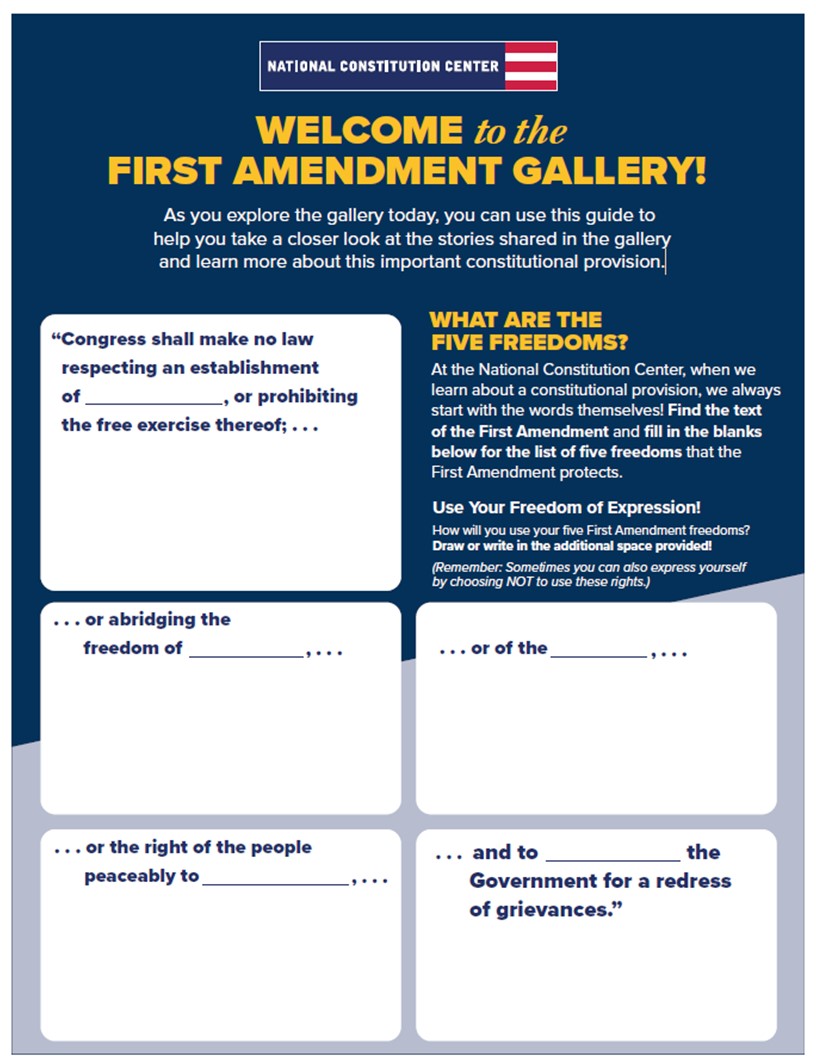
Lesson Plans
First Amendment: Speech
This lesson encourages students to examine their own assumptions and to deepen their understanding of current accepted interpretations of speech rights under the First Amendment.
Lesson Plans
First Amendment: Speech Lesson Plan Activity Sheets
Classroom Activities
Founding Fathers Word Puzzle
Learn about the signers of the U.S. Constitution with this word puzzle.
Lesson Plans
Fourth Amendment – Search and Seizure Lesson
Classroom Activities
Fourth Amendment Class Briefing Document
Classroom Activities
Fourth Amendment Class Slide Deck
Classroom Activities
Fourth Amendment Class Worksheets
Onsite Resources
Free to be You Guided Experience
Onsite Resources
Free to Be You Show
Onsite Resources
Free to Be You Workshop
Lesson Plans
Getting to Know the Founding Fathers
Learn more about the signers of the Constitution with these Founding Fathers biographies.
Primary and Secondary Sources
Getting to Know the Founding Fathers
Learn more about the delegates of the Constitutional Convention with these Founding Fathers biographies.
Onsite Resources
http://constitutioncenter.org/experience/exhibitions/main-exhibition/the-story-of-we-the-people
Onsite Resources
http://constitutioncenter.org/visit/group-visits/themed-museum-packages/
Lesson Plans
Interactive Constitution: Eighth Amendment
Lesson Plans
Interactive Constitution: Fourth Amendment
Lesson Plans
INTERACTIVE CONSTITUTION: SECOND AMENDMENT
This lesson introduces students to different viewpoints and debates surrounding the 2nd Amendment by using the National Constitution Center’s Interactive Constitution. Students will build understanding of the resources and methods used by justices on the Supreme Court and Constitutional scholars when analyzing and forming opinions about articles, sections, and clauses of the Constitution.
Lesson Plans
Investigating the Departments of the Executive Branch
In this lesson, students learn about the role of bureaucracy in U.S. government.








